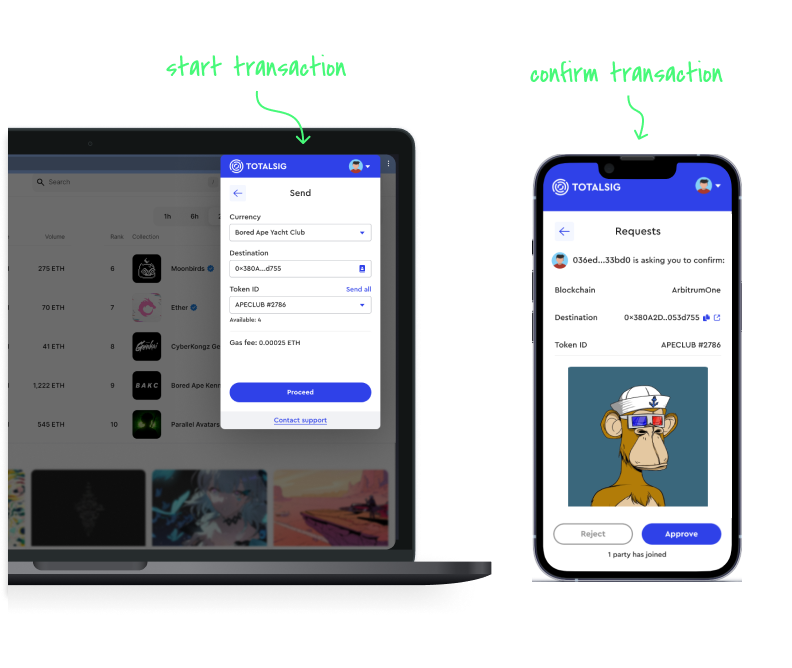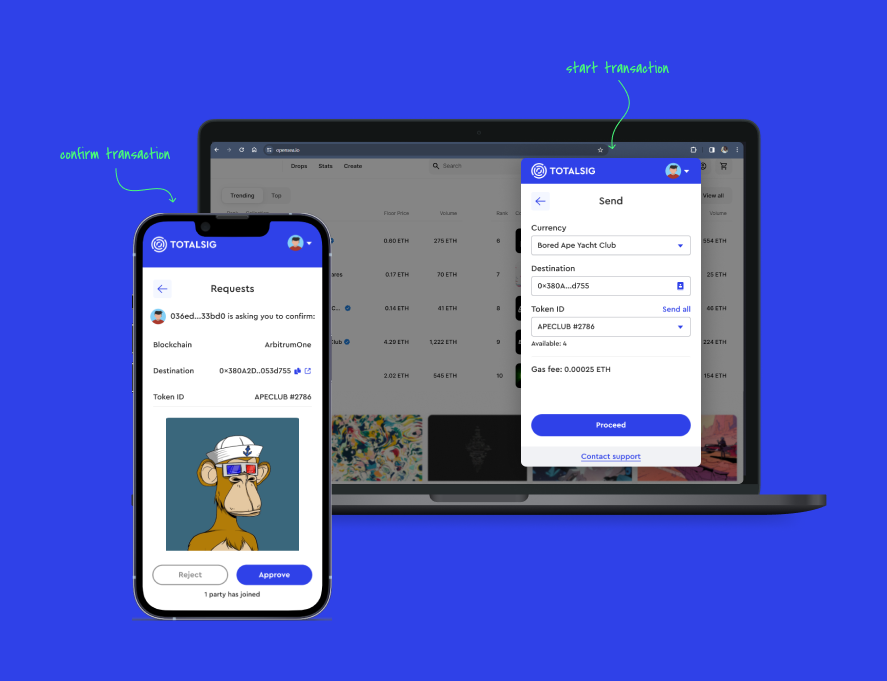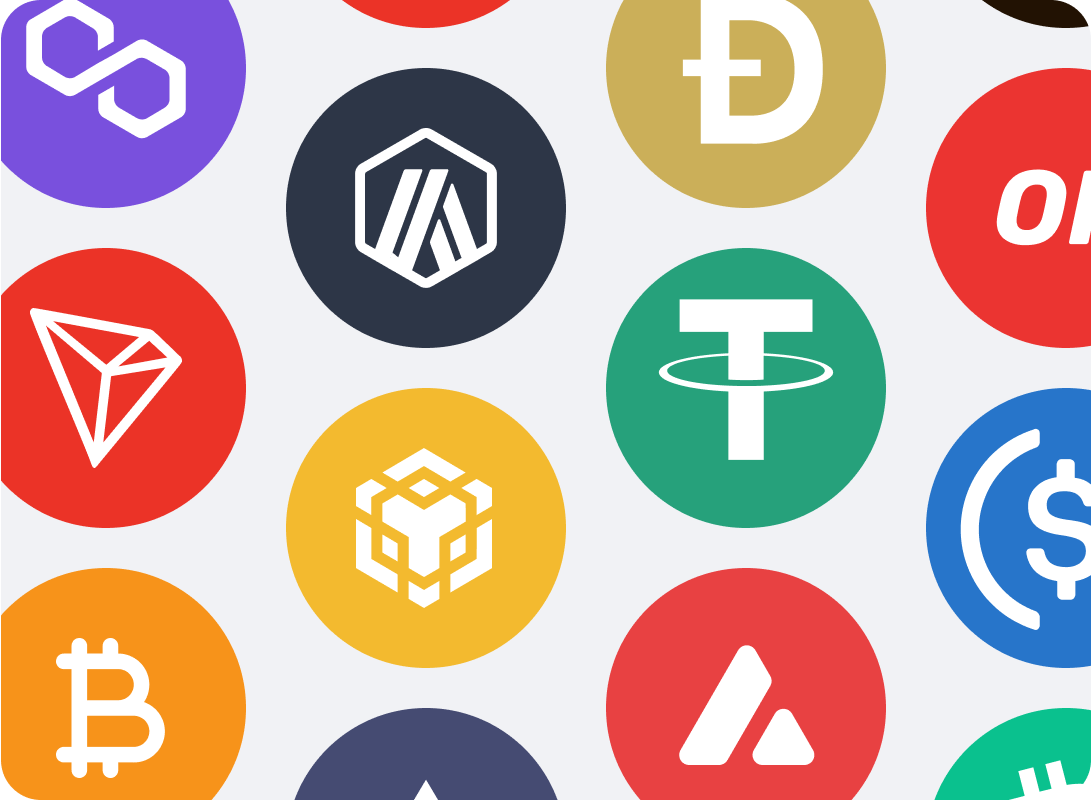TotalSig makes managing Arbitrum multisigs simple and easy. There's no need to spend hours searching for new solutions and grappling with complex processes when you can achieve it with just one click. Arbitrum multisigs are finally here, enhancing your team's business operations with security and convenience.
Download Wallet

How to Use Arbitrum MultiSig
Arbitrum MultiSig Fees
Operation costs
TotalSig
FREE
Other multisigs
FREE
Totalsig reduces operational costs by eliminating the need for smart contract deployment. Previously available only to large institutional players, Totalsig now makes MPC technology accessible to everyone.
Why There is Price Difference?
Unlike other solutions that rely on smart contracts, known for their complexity and high costs, TotalSig employs MPC multisigs. This newer standard, embraced by leading institutional players, significantly reduces multisig expenses and enhances the user experience.
MPC multisigs on the Arbitrum network are more cost-effective compared to traditional smart contract multisigs. This is because they require only one signature per transaction, bypassing the expensive deployment of a smart contract which typically incurs a large network fee.
Why Use MultiSig Wallet

Increased Security
Traditional wallets rely on a single access point, which, if breached, leaves funds vulnerable. Multisig wallets elevate security, necessitating multiple private keys for transactions. A fortified barrier, it substantially reduces the chances of unauthorized access and fund theft.

Risk Mitigation
In traditional single-key systems, if a key holder is unavailable, it can disrupt operations. Multisig addresses this risk. With multiple key holders, transactions proceed without delay, ensuring smooth business operation.

Shared Ownership
In instances where assets need collective decision-making, multisig wallets shine. By distributing control among several parties, it mandates consensus for transactions, ensuring that no single entity holds unilateral power, fostering collaboration and mutual trust.

Decentralized Organizations
Embracing the ethos of decentralization, multisig wallets cater perfectly to decentralized autonomous organizations (DAOs). With no central authority, these wallets empower collective management, ensuring that decisions and transactions echo the shared values and visions of its members.
Wallet Features
Free multisig wallets
TotalSig supports ETH, the native cryptocurrency of the Arbitrum network. Transactions, whether transferring ETH, ARB tokens, USD stablecoins, or executing smart contracts, require ETH to cover the transaction fees.

Token Support
Our multisig wallet offers support for the ERC20 and ERC721 standards, which are the predominant token formats within the Arbitrum network. This ensures that any tokens adhering to these standards, whether received as part of a transaction or a smart contract execution, will seamlessly appear in your wallet.

NFT Support
TotalSig supports NFT applications, allowing you to create a treasury with your friends or business partners to easily store your Arbitrum NFTs.

Best fee calculator
TotalSig provides a premium fee calculator designed to ensure you pay the least possible fees. Unlike other wallets that might place a lower priority on fee optimization, leading to possible overpayments by two to three times, TotalSig prioritizes cost efficiency, especially beneficial for Arbitrum transactions.


About Arbitrum
What is Arbitrum?
Arbitrum is a layer 2 scaling solution designed to enhance the capabilities of Ethereum, the decentralized blockchain platform with smart contract functionalities. While Ethereum itself was launched in 2015 and is well-known for being the second most valuable cryptocurrency platform after Bitcoin, Arbitrum operates on top of Ethereum to provide faster and cheaper transactions.
Arbitrum ecosystem
Background
Developed by Offchain Labs, Arbitrum helps address the scalability challenges faced by the Ethereum network by processing transactions off the main Ethereum chain and securing them using its layer 1 security. This allows for the creation and execution of decentralized applications (dApps) and smart contracts with greater efficiency while still maintaining the decentralized nature and security provided by the underlying Ethereum blockchain. Arbitrum achieves this without requiring central oversight, thus protecting against third-party interference and preserving the trustless integrity that Ethereum is known for.
Purpose
Arbitrum's mission is to enhance Ethereum's capability by providing a layer 2 scaling solution where developers can build and operate DApps and smart contracts more efficiently. By handling transactions off the main Ethereum chain while still utilizing Ethereum's security as its base layer, Arbitrum promotes faster processing times and lower costs, thereby extending Ethereum's vision of fostering a new era of digital innovation across various sectors without control from any central authority.
Coins
Arbitrum does not have its own native cryptocurrency. Instead, it utilizes Ether (ETH), the native currency of the Ethereum network, to fuel transactions and operations on its platform. By aggregating transactions off-chain and settling them on Ethereum, Arbitrum helps in reducing the overall transaction costs and enhancing transaction throughput, all while leveraging the security of Ethereum.
Types of Arbitrum wallets
Choosing the perfect wallet for managing assets on Arbitrum involves navigating through an array of choices tailored to different user preferences, which span the spectrums of security, convenience, or a combination of both. Each type caters to distinct requirements and offers unique features.
Hardware wallet
Hardware wallets are considered the gold standard for security among cryptocurrency storage solutions. These tangible devices ensure that your private keys critical for accessing your Arbitrum assets remain offline, safeguarded from the omnipresent threats of the internet. Transactions require the physical connection of the device to a computer or smartphone, combining high security with user-friendly interfaces protected by pins or passwords.
Despite their robust security, hardware wallets can be less convenient for users who need frequent access to their digital assets, and their cost can be a barrier for some.
Web wallet
Web wallets, accessible through browser extensions or dedicated websites, offer the ultimate convenience within the Arbitrum wallet ecosystem. They streamline the setup process to just account creation and pin setup, without the need for cumbersome downloads or installations.
Designed for users who prioritize ease of access and frequent transactions, web wallets do have vulnerabilities due to their online nature, which increases susceptibility to cyber-attacks. This centralized storage of information can be a lucrative target for hackers. Caution is advised, particularly with custodial web wallets, where control over private keys may be relinquished, potentially compromising security.
Desktop wallets
Desktop wallets provide a balance of accessibility and security. They function as software installed directly on the user's computer, storing private keys on the user's device to offer a secure storage solution when the device is offline, similar to hardware wallets. However, the required persistent internet connection introduces risks, including vulnerability to viruses or targeted cyber-attacks.
When used judiciously with the computer maintained offline except for occasional transactions desktop wallets can be a secure option for managing your Arbitrum assets. Wallets like Guarda and Atomic exemplify the potential of desktop wallets to combine security with user-friendly interfaces.
Frequently Asked Questions
A multi signature wallet is a cryptocurrency wallet that requires multiple private keys to authorize transactions. Unlike traditional wallets that need only one signature, multisig wallets distribute control among multiple parties, significantly enhancing security and reducing single points of failure.
There are many ways Multisig wallets can be used, for example:
1. Additional layer of security - more than one key is required to approve any transaction.
2. Business continuity - ensure that either any one of the owners can approve a transaction.
3. Group control - a certain number of co-owners is required to approve any spending, for
example project stakeholders need to agree on certain spending.
4. Backup and inheritance - store additional keys that can be passed to your relatives if
something happens.
5. Escrow - can be used to create trust-minimized escrow solutions, where a neutral third
party can facilitate a transaction between two parties.
There are many multisig wallets available, each offering different features and supporting various use cases.
Most multisig wallets are limited to a single protocol, which can restrict flexibility.
TotalSig stands out as the only widely available option that supports a broad range of protocols. To see how different
wallets compare, check out the full article.
Download the TotalSig extension from the Chrome Web Store and follow our simple 3-step setup:
1. Create your secure account
2. Set up your multisig wallet with your preferred approval rules (like 2-of-3 signatures)
3. Invite co-signers to join your wallet
The whole process takes under 5 minutes, and you'll have enterprise-grade security for your crypto assets.
Our built-in guide walks you through each step.
MPC multisig wallets utilize cryptographic protocols to enable multiple parties to collaboratively create and manage private keys without ever sharing the complete key. This allows for secure transaction signing without exposing sensitive information.
TotalSig employs bank-grade security with MPC technology, 256-bit encryption, and multi-signature protection, making it
one of the most secure multisig wallets available. As a non-custodial multisig wallet, you always maintain full control.
We never have access to your private keys or funds. Your assets remain protected even if one device is compromised, since transactions
require multiple approvals from independent signers. Our codebase is fully audited, and we've securely managed millions in assets
without a single breach.
We support multiple blockchains including: Bitcoin, Ethereum, Tron, Solana, Litecoin, BNB Smart Chain, Tether, Dai token, NFT, Polygon, Arbitrum, Avalanche, Bitcoin Cash, Dogecoin, Optimism. See full list of supported coins and tokens.
The escrows operate using multi-signature wallets on different blockchains, enabling secure, trustless transactions between parties.
When a transaction is initiated, the funds are locked in a multisig wallet controlled by both the involved parties and the platform. If both
parties agree, the transfer is completed smoothly. However, if something goes wrong, such as a dispute or timeout, the platform can roll back
the transaction, automatically returning the funds to the original addresses.
The platform coordinates the process to ensure that funds remain secure and can only be released with the required approvals. This mechanism
functions similarly to atomic swaps,
providing a secure, decentralized way to manage escrows across multiple chains.